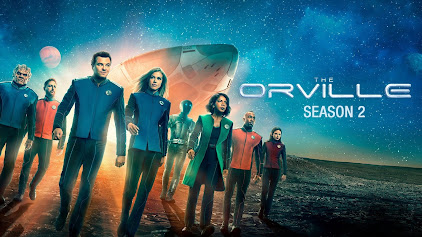The first season of The Orville was an interesting, if variable, show which saw "Seth MacFarlane do Star Trek." The results were initially unappealing, with non-sequitur toilet humour intruding into dramatic scenes, but the show gradually improved over its length until it became surprisingly effective in its role as a Star Trek: The Next Generation cover band.
Season 2 takes the solid growth shown in the first season and dramatically improves upon it. The characters all get better, stronger arcs, the writing is definitely a step above what it was in the first season and the show is both dynamic and more ambitious, driven by some fantastic visual effects (the space battles near the end of the season leave all the over-stylised and barely-discernible battles in Star Trek: Discovery and Picard comfortably in the dust). Apparently cheesy storylines - like Dr. Finn's relationship with the android Isaac - are surprisingly played to the hilt by their talented actors and play a key role in the season's over-arcing plot.
The show even takes the biggest misstep in the first season - the very clumsy handling of the issues raised in the episode About a Girl - and uses that mistake to drive the plots of several episodes, exploring the relationship between Bortus, his mate Klyden and their child, Topa and expanding more on the worldbuilding of the Moclan culture. It's great when a show realises it's made a mistake and course-corrects in a constructive way that leads to better stories.
There is a regrettable departure early in the season: Halston Sage's character, Alara, was not given a lot to do in the first season but by the end of the season and in the first few episodes of this, she gets some great material. Her showcase comes in Home where she has to investigate a mystery and overcome disabilities imposed by her homeworld's cripplingly high gravity, which she rises to with aplomb (with excellent performances by Star Trek: Voyager's Robert Picardo and Enterprise's John Billingsley). Unfortunately, she had to leave the show in this episode for scheduling reasons, which is a shame. Her replacement, Jessica Szohr as Lt. Talla Keyali, is a great character as well, fortunately.
The show also continues doing it's thing of finding Star Trek-ish episodes and making good stories about them: All the World is Birthday Cake is a surprisingly effective take on old-school Star Trek warnings about superstition trumping reason. Lasting Impressions takes on the old issue of people getting addicted to the holodeck but comes at it from a completely different angle, and finally gives the underused Scott Grimes a really good acting showcase.
In fact, there isn't really a bad episode in the batch. Deflectors and Blood of Patriots are both a bit predictable, but not too bad. The season does offer up two formidable two-part stories: Identity is The Orville trying to do a story with the epic scope and gravitas of The Next Generation's The Best of Both Worlds and if it can't quite match that, it gets surprisingly close. The two-part finale, which riffs on the original series' City on the Edge of Forever and TNG's Yesterday's Enterprise, remixes standard SF tropes into a fairly gripping new mixture.
A few problems persist even in the better episodes. MacFarlane is better this season, but still arguably the weakest link in a very strong cast. The reduction of comedy in favour of character drama is welcome, but occasionally it feels like the team felt they had to remind everyone they are something of a comedy show, resulting in the odd non-sequitur gag (usually falling completely flat) slipping through the lines and feeling even more out of place than in Season 1. But these are relatively few and far between.
Season 2 of The Orville (****½) is a hugely impressive step up from the much more variable first season, establishing real stakes, evolving the characters well and telling an over-arcing story with considerable aplomb. It may be the best project Seth MacFarlane has ever been involved with. The season is airing on Disney+ worldwide and Hulu in the United States. The much, much-delayed Season 3 is due to start airing in June this year.

